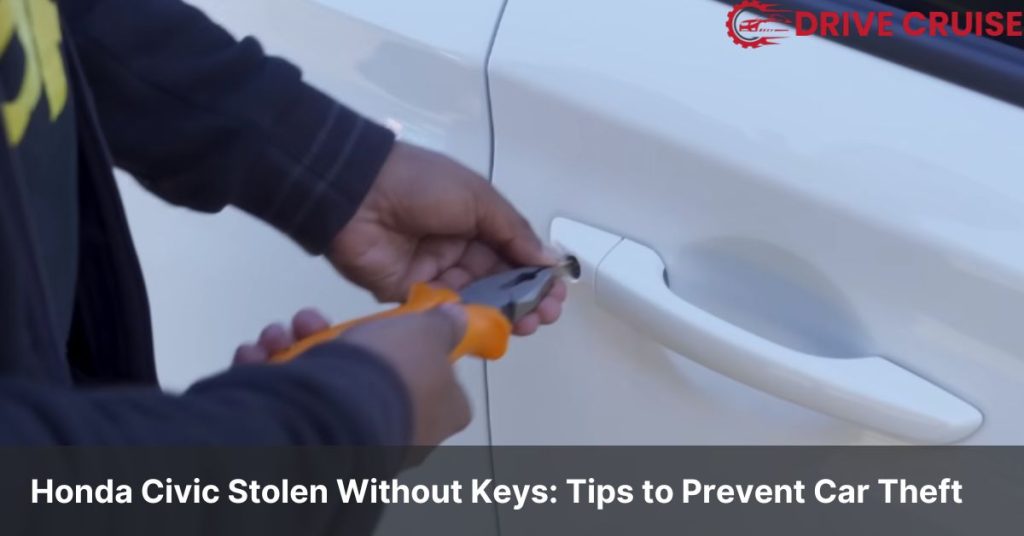Honda Civics are among the most popular cars on the road, which makes them a prime target for theft. Unfortunately, even if you take all the necessary precautions, your Civic could still be stolen without the use of keys. This is a growing trend that has been on the rise in recent years, and it is important to be aware of the potential vulnerabilities of your car.
One of the main reasons that Honda Civics are targeted by thieves is their widespread ownership. Because so many people own these cars, they are more likely to be targeted by criminals who are looking for an easy score. Additionally, the increasing popularity of keyless ignitions has made it easier for thieves to gain access to your car without the need for a physical key. This is a trend that is expected to continue in the coming years, so it is important to take steps to protect your vehicle.
Common Methods for Stealing Keyless Honda Civics
If you own a Honda Civic with a keyless entry system, you should be aware that it is vulnerable to theft. Thieves have found ways to steal these cars without needing the key fob. Here are some of the most common methods used to steal keyless Honda Civics.
Relay Attack (Relay Station Attack)
One of the most common methods for stealing keyless Honda Civics is the relay attack, also known as the relay station attack. Thieves use a relay device to amplify the signal emitted by the key fob. The signal is then transmitted to another device located near the car, which tricks the car into thinking that the key fob is nearby. This allows the thief to unlock and start the car.
To prevent relay attacks, you can use a Faraday cage key fob or a signal-blocking pouch. These devices prevent the key fob’s signal from being amplified.
ECU Remapping (ECU Cloning)
Another method used to steal keyless Honda Civics is ECU remapping, also known as ECU cloning. Thieves exploit weaknesses in the Electronic Control Unit (ECU) to bypass the car’s security systems. This method is technically complex, but it is still a potential threat.
To prevent ECU remapping, you can install an aftermarket security system or use a steering wheel lock. These devices make it more difficult for thieves to steal your car.
Other Possibilities
There are other theft methods that might be less common but still possible. For example, thieves can use code-grabbing devices to intercept the signal emitted by the key fob. They can also exploit software vulnerabilities to bypass the car’s security systems. However, these methods are less common than the relay attack and ECU remapping.
To prevent these theft methods, you can install a GPS tracking system or use a physical barrier such as a car cover. These measures make it more difficult for thieves to steal your car.
Protecting Your Keyless Honda Civic
If you are a Honda Civic owner, protecting your car from theft should be one of your top priorities. With the rise of keyless entry systems, car thieves have found new ways to steal cars without using a physical key. In this section, we will discuss some essential tips and strategies to protect your Honda Civic from being stolen.
Security System Awareness
Before anything else, you should familiarize yourself with the specific security features of your Honda Civic model. Most Honda Civics come with an immobilizer and an alarm system. Make sure to enable all available security features and use them consistently. Doing so will deter thieves from attempting to steal your car.
Key Fob Storage
Storing your key fob far away from the car can help prevent relay attacks. Relay attacks are a type of car theft that involves using a relay amplifier to trick the car into thinking the key fob is nearby. To prevent this, store your key fob in a safe place, such as a drawer or a signal-blocking pouch. Faraday cage key fobs or signal-blocking pouches are additional security measures that can help protect your key fob from being hacked.
Software Updates
Honda regularly releases software updates to address potential security vulnerabilities. It is important to stay updated on the latest software updates from Honda to ensure that your car’s security system is up-to-date. Make sure to check for updates regularly and install them as soon as they become available.
Physical Deterrents
Installing a steering wheel lock or a visible aftermarket alarm system can act as visual deterrents to car thieves. These physical deterrents make it harder for thieves to steal your car and can discourage them from attempting to do so.
Tracking and Recovery Systems
Installing a GPS tracking and recovery system can provide added peace of mind in the event that your car is stolen. These systems allow you to track your car’s location in real-time and can help law enforcement recover your car if it is stolen.
What to Do If Your Honda Civic Is Stolen
If your Honda Civic is stolen, it can be a stressful and frustrating experience. However, there are several steps you can take to increase the chances of recovering your vehicle and minimizing financial loss. In this section, we will cover the immediate actions you should take, the insurance considerations, and the preventative measures you can implement to avoid future thefts.
Immediate Actions
The first thing you should do if your Honda Civic is stolen is to contact the police immediately. Report the theft and provide all relevant information about the vehicle, such as the VIN number, license plate, and any other identifying features. The more information you can provide, the better the chances of recovering your vehicle.
Insurance Considerations
After contacting the police, you should also contact your insurance company as soon as possible to initiate a claim. Your insurance policy may cover the theft of your Honda Civic, but you need to report the theft to your insurance company as soon as possible to ensure that your claim is processed quickly and efficiently.
Preventing Future Thefts
To prevent future thefts, it is important to review the preventative measures mentioned earlier to strengthen security after recovering the vehicle (if applicable). Some of these measures include:
- Installing an anti-theft device such as an alarm system or steering wheel lock.
- Parking your Honda Civic in a well-lit area or a garage.
- Avoid leaving valuables in your vehicle.
- Always lock your car doors and windows.
By taking these preventative measures, you can reduce the risk of your Honda Civic being stolen in the future.
Conclusion: Staying Ahead of Evolving Theft Techniques
As you’ve learned, keyless theft techniques have become more sophisticated and prevalent in recent years. It’s important to remain aware of these evolving methods to protect your Honda Civic from being stolen without keys.
Implementing preventative measures can go a long way in deterring thieves. Consider using a steering wheel lock or wheel clamp, as well as installing an alarm system and a GPS tracking device. These can make it more difficult for thieves to steal your car and increase the chances of recovering it if it is stolen.
Additionally, remaining vigilant and aware of your surroundings can help you avoid becoming a victim of keyless car theft. Be cautious of anyone who seems to be loitering around your car or following you closely. Always keep your keys in a safe place and never leave them unattended.
If you’re unsure about the best ways to protect your Honda Civic from keyless theft, consider consulting a trusted automotive security specialist for further guidance. They can provide you with personalized recommendations and help you find the right security solutions for your needs.
By taking these steps, you can help ensure that your Honda Civic remains safe and secure from the latest keyless theft techniques.
Related Posts:
- BFGoodrich Mud Terrain T/A KM2 vs KM3: Which One to Choose?
- Continental vs Bridgestone Tires: Which One is the Best for You?
- Goodyear vs Bridgestone Tires: Which is the Best Option for Your Vehicle?
- Honda Civic Stolen Without Keys: Tips to Prevent Car Theft
- How Many Gears Does a Semi Truck Have? A Friendly Guide to Understanding Semi Truck Transmissions
- How to Complete Drive Cycle Without Driving: Tips and Tricks
- Starting Disabled Service Throttle: A Step-by-Step Guide
- Tire Squeaks When Turning: Causes and Solutions
- Toyota Highlander Off Road Mods: Enhance Your Adventure Experience
- Yokohama Advan Sport A S Plus Review: A Friendly Guide to a Top-Performing Tire












